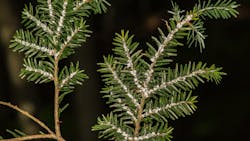Michigan awards $3.6M for invasive species projects
The state of Michigan has announced $3.6 million in grants for 35 projects through the state’s Invasive Species Grant Program.
This year’s grantees have also offered $532,300 in matching funds and services to support these projects, leveraging a total investment of $4,132,300.
The state’s grant funds will support several early detection and response efforts for the following watch list invasive species, such as:
- Continuing survey and treatment of hemlock woolly adelgid in Oceana, Mason, Benzie and other counties along the Lake Michigan shoreline.
- Surveying and creating “trap trees” for spotted lanternfly across the Huron-Clinton Metroparks in Oakland and Macomb counties.
- Refining the potential for early detection of didymo (rock snot) using environmental DNA and testing environmental variables that may lead to stalk-producing “blooms.”
- Coordinating red swamp crayfish surveys across the Clinton and Rouge river watersheds.
- Initiating outreach and monitoring for watch list tree pests and diseases on the Pokagon Band of Potawatomi Indians’ tribal lands.
- Treating known locations of mile-a-minute weed and expanded surveys in the vicinity of Albion in southwest Michigan.
- Coordinating Himalayan balsam survey, removal and outreach across the Upper Peninsula.
Michigan’s funding also will support four auxiliary efforts to prevent the spread of invasive species:
- Testing the effectiveness of household cleaners to decontaminate waders, boats and equipment exposed to didymo and New Zealand mudsnails.
- Training paddle sport enthusiasts to decontaminate boats between uses and to look for and report aquatic invasive species.
- Spreading the “Clean, Drain, Dry” message using a mobile boat wash at popular boating access sites in southeast Michigan.
- Evaluating nitidulid beetle and oak tree cycles in the Upper Peninsula to better predict risk periods for spreading oak wilt.
This year’s grants also support 21 regional cooperative invasive species management areas (CISMAs), a network of partnership organizations working to manage and control invasive species and provide service across the state. CISMA projects include enhanced education and outreach, technical assistance to landowners, and survey and treatment of high-priority invasive species.
The Michigan Invasive Species Grant Program addresses prevention, detection, eradication and control of aquatic and terrestrial invasive species in Michigan through four key objectives:
- Preventing the introduction of new invasive species.
- Strengthening the statewide invasive species early detection and response network.
- Limiting the spread of recently confirmed invasive species.
- Managing and controlling widespread, established invasive species.
The full list of grant recipients, project descriptions and award amounts is available on the Michigan Invasive Species Grant Program website.
